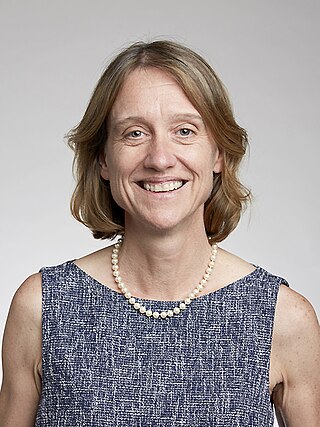Top Qs
Timeline
Chat
Perspective
Alison Noble
British engineer (born 1965) From Wikipedia, the free encyclopedia
Remove ads
Julia Alison Noble (born 28 January 1965) is a British engineer. She has been Technikos Professor of Biomedical Engineering at the University of Oxford and a fellow of St Hilda's College[2][1][7][8] since 2011, and Associate Head of the Mathematical, Physical and Life Sciences Division at the university. As of 2017[update], she is the chief technology officer of Intelligent Ultrasound Limited,[3] an Oxford spin-off in medical imaging[4] that she cofounded. She was director of the Oxford Institute of Biomedical Engineering (IBME) from 2012 to 2016.[3][9] In 2023 she became the Foreign Secretary of The Royal Society (jointly with Mark Walport).[10]
Remove ads
Education
Julia Alison Noble was born on 28 January 1965 in Nottingham, England, to James Bryan Noble and Patricia Ann Noble.[2] She was educated at Maidstone Grammar School for Girls[11] in Kent and was an undergraduate student at St Hugh's College, Oxford, where she was awarded a first-class[2] Bachelor of Arts degree in Engineering Science in 1986 followed by a Doctor of Philosophy degree in 1989 for research on computer vision and image segmentation supervised by J. Michael Brady.[5][6][12]
Remove ads
Career and research
Summarize
Perspective
Noble started her career as a research scientist at the General Electric Corporate R&D Center in Schenectady, New York, where she worked from 1989 to 1994 on developing inspection systems for aircraft engines.[2][13][14] She returned to the University of Oxford as a lecturer in 1995 to work on medical applications of computer vision[14] and was promoted to Professor in 2001,[2] as the first female Statutory Professor in Engineering at Oxford.[15]
Noble has made contributions to medical image computing, where her research interests combine knowledge of medical imaging and computational science to support decision-making in clinical medicine.[1][16] Her research has advanced understanding of automatic extraction of clinically useful information from medical ultrasound scans and developed machine learning solutions to key problems in biomedical image analysis.[17][18][19][20][21]
Noble has supervised or co-supervised over 50 successful PhD students to completion[13][5] including Miklós Gyöngy,[22] Nathan Cahill,[23] Ramón Casero Cañas,[24] and Grace Vesom.[25] Her research has been funded by the European Research Council (ERC),[3] the Medical Research Council (MRC), the Engineering and Physical Sciences Research Council (EPSRC) and the National Institute for Health Research (NIHR).[12][26]
As part of her work in AI she co-founded the Oxford University spin-out, Intelligent Ultrasound, with her longstanding collaborator, Aris Papageorghiou.
Honours and awards
Noble was elected a Fellow of the Royal Society (FRS) in 2017.[16] She was appointed Officer of the Order of the British Empire (OBE) in the 2013 Birthday Honours, elected a Fellow of the Royal Academy of Engineering (FREng) in 2008[27] and a Fellow of the Institution of Engineering and Technology (FIET) in 2001.[2] Noble was promoted to Commander of the Order of the British Empire (CBE) in the 2023 Birthday Honours for services to engineering and biomedical imaging.[28]
She is a trustee of the Oxford Trust,[29] a charity established by the founders of Oxford Instruments to encourage the study, application and communication of science, technology, engineering, and mathematics. She is also a trustee of the Institution of Engineering and Technology and served as President of the Medical Image Computing and Computer-Assisted Interventions (MICCAI) Society from 2013 to 2016.[30] As of 2017[update], Noble is an Honorary Fellow of Oriel College, Oxford, and is a MICCAI Society Fellow. She was the first recipient of the Laura Bassi Award of the International Federation of Medical and Biological Engineering in 2015.[31] Previously she was a fellow of Wolfson College, Oxford, from 2005 to 2011.[2] In 2018 she presented the Woolmer Lecture.[32] In 2019, Professor Noble was awarded the Gabor Medal by the Royal Society "for developing solutions to a number of key problems in biomedical image analysis and substantially advancing automatic extraction of clinically useful information from medical ultrasound scans".
Remove ads
Personal life
Noble was a coxswain for the Oxford University Women's Lightweight Rowing Club in the Henley Boat Races in 1985.
References
Wikiwand - on
Seamless Wikipedia browsing. On steroids.
Remove ads

